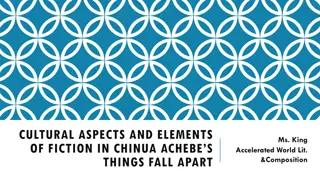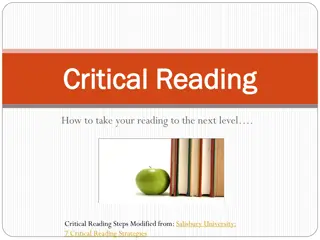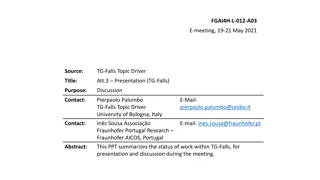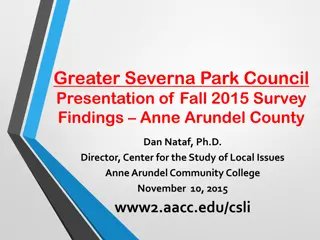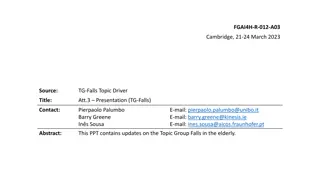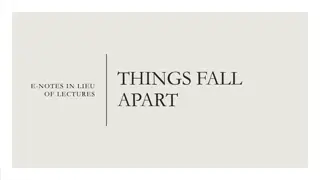Critical Analysis of Chinua Achebe's Things Fall Apart
Chinua Achebe's novel "Things Fall Apart" presents a vivid portrayal of a Nigerian society during colonization, showcasing the internal weaknesses that lead to its downfall in the face of foreign influences. The story draws parallels to W.B. Yeats' apocalyptic vision in "The Second Coming," illustrating the collapse of traditional values and structures amidst the intrusion of new religious and governmental forces. Achebe's work challenges Western perceptions of African societies, aiming to convey the complexity and dynamism of these cultures to a broader audience.
Download Presentation

Please find below an Image/Link to download the presentation.
The content on the website is provided AS IS for your information and personal use only. It may not be sold, licensed, or shared on other websites without obtaining consent from the author.If you encounter any issues during the download, it is possible that the publisher has removed the file from their server.
You are allowed to download the files provided on this website for personal or commercial use, subject to the condition that they are used lawfully. All files are the property of their respective owners.
The content on the website is provided AS IS for your information and personal use only. It may not be sold, licensed, or shared on other websites without obtaining consent from the author.
E N D
Presentation Transcript
I. B. PG College Panipat
Presented By: Professor Priya Bareja Department of English I. B. PG College, Panipat
Class- B.A. (Hons.) Final year Subject- Modern World literature (part-II) Topic- Things Fall Apart - Critical Analysis
Introduction Chinua Achebe's Things Fall Apart is probably the most authentic narrative ever written about life in Nigeria at the turn of the twentieth century. Although the novel was first published in 1958 two years before Nigeria achieved its independence thousands of copies are still sold every year in the United States alone. Millions of copies have been sold around the world in its many translations. The novel has been adapted for productions on the stage, on the radio, and on television.
The novel takes its title from a verse in the poem "The Second Coming" by W. B. Yeats, an Irish poet, essayist, and dramatist: Turning and turning in the widening gyre The falcon cannot hear the falconer; Things fall apart; the center cannot hold; Mere anarchy is loosed upon the world.
In this poem ironically, a product of European thought Yeats describes an apocalyptic vision in which the world collapses into anarchy because of an internal flaw in humanity. In Things Fall Apart, Achebe illustrates this vision by showing us what happened in the Igbo society of Nigeria at the time of its colonization by the British. Because of internal weaknesses within the native structure and the divided nature of Igbo society, the community of Umuofia in this novel is unable to withstand the tidal wave of foreign religion, commerce, technology, and government.
In "The Second Coming," Yeats evokes the anti-Christ leading an anarchic world to destruction. This ominous tone gradually emerges in Things Fall Apart as an intrusive religious presence and an insensitive government together cause the traditional Umuofian world to fall apart.
Literary Purpose When Things Fall Apart was first published, Achebe announced that one of his purposes was to present a complex, dynamic society to a Western audience who perceived African society as primitive, simple, and backward. Unless Africans could tell their side of their story, Achebe believed that the African experience would forever be "mistold," even by such well-meaning authors as Joyce Cary in Mister Johnson. Cary worked in Nigeria as a colonial administrator and was sympathetic to the Nigerian people.
Yet Achebe feels that Cary, along with other Western writers such as Joseph Conrad, misunderstood Africa. Many European writers have presented the continent as a dark place inhabited by people with impenetrable, primitive minds; Achebe considers this reductionist portrayal of Africa racist. He points to Conrad, who wrote against imperialism but reduced Africans to mysterious, animalistic, and exotic "others." In an interview published in 1994, Achebe explains that his anger about the inaccurate portrayal of African culture by white colonial writers does not imply that students should not read works by Conrad or Cary.
On the contrary, Achebe urges students to read such works in order to better understand the racism of the colonial era. Achebe also kept in mind his own Nigerian people as an audience. In 1964, he stated his goal: to help my society regain belief in itself and put away the complexes of the years of denigration and self- abasement. . . . I would be quite satisfied if my novels . . . did no more than teach my [African] readers that their past with all its imperfections was not one long night of savagery from which the first Europeans acting on God's behalf delivered them.
In Things Fall Apart, the Europeans' understanding of Africa is particularly exemplified in two characters: the Reverend James Smith and the unnamed District Commissioner. Mr. Smith sees no need to compromise on unquestionable religious doctrine or practices, even during their introduction to a society very different from his own. He simply does not recognize any benefit for allowing the Nigerians to retain elements of their heritage.
The District Commissioner, on the other hand, prides himself on being a student of primitive customs and sees himself as a benevolent leader who has only the best intentions for pacifying the primitive tribes and bringing them into the modern era. Both men would express surprise if anyone suggested to them that their European values may not be entirely appropriate for these societies. The Commissioner's plan for briefly treating the story of Okonkwo illustrates the inclination toward Western simplification and essentialization of African culture.
To counter this inclination, Achebe brings to life an African culture with a religion, a government, a system of money, and an artistic tradition, as well as a judicial system. While technologically unsophisticated, the Igbo culture is revealed to the reader as remarkably complex. Furthermore, Things Fall Apart ironically reverses the style of novels by such writers as Conrad and Cary, who created flat and stereotypical African characters. Instead, Achebe stereotypes the white colonialists as rigid, most with imperialistic intentions, whereas the Igbos are highly individual, many of them open to new ideas.
But readers should note that Achebe is not presenting Igbo culture as faultless and idyllic. Indeed, Achebe would contest such a romantic portrayal of his native people. In fact, many Western writers who wrote about colonialism (including Joseph Conrad, George Orwell, Herman Melville, and Graham Greene) were opposed to imperialism but were romantic in their portrayal of noble savages primitive and animalistic, yet uncorrupted and innocent.
The opposition to imperialism that such authors voiced often rested on the notion that an advanced Western society corrupts and destroys the non- Western world. Achebe regards this notion as an unacceptable argument as well as a myth. The Igbos were not noble savages, and although the Igbo world was eventually destroyed, the indigenous culture was never an idyllic haven, even before the arrival of the white colonialists. In Things Fall Apart, Achebe depicts negative as well as positive elements of Igbo culture, and he is sometimes as critical of his own people as he is of the colonizers.
Achebe has been a major force in the worldwide literary movement to define and describe this African experience. Other postcolonial writers in this movement include Leopold Senghor, Wole Soyinka, Aime Cesaire, Derek Walcott, Ngugi wa Thiong'o, and Birago Diop. These writers not only confront a multiethnic perspective of history and truth, but they also challenge readers to reexamine themselves in this complex and evolving world.
As an African novel written in English and departing significantly from more familiar colonial writing, Things Fall Apart was a ground breaking work. Achebe's role in making modern African literature a part of world literature cannot be understated.









